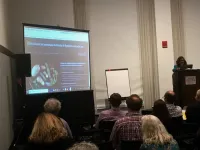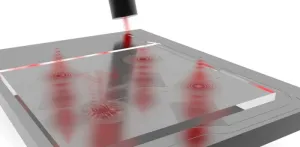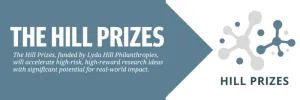(Press-News.org) Researchers from City, University of London, in collaboration with the University of Surrey, De Montfort University, Universities UK (UUK) and the National Centre (NatCen) for Social Research have conducted the first pilot study into students’ experiences of all forms of violence and victimisation at UK universities.
The Violence at University project, led by Dr Carrie-Anne Myers, Reader in the Department of Sociology and Criminology at City, aimed to investigate whether an effective tool could be developed for tracking when, where and how incidents take place.
Tackling violence and harassment has been high on universities’ agenda for several years. Hate crime has a considerable impact on young people in particular, with potential long-lasting damage to self-esteem and emotional health as well as a fall in student attainment. In 2016, UUK launched a strategic framework titled ‘Changing the Culture’ to support universities in responding to and preventing violence and crime affecting university students.
The pilot project worked with university students to create a questionnaire that could measure the incidence of violence in all forms on university campuses and beyond. A resulting survey explored demographics of respondents, as well as their experiences of sexual, identity-based, and broader forms of violence, and both the reporting and barriers to reporting it.
Key findings from the initial survey included:
The survey attracted 263 responses which detailed encounters of sexual, identity-based and broader incidents of violence that had either happened, were happening or repeatedly took place, either on campus or elsewhere.
The survey uncovered a mix of responses to whether or not these incidents had been reported, with 47 per cent saying they had and 46 per cent saying they had not.
Respondents named a range of support mechanisms they had sought, including friends and fellow students, student representatives, professional and/or teaching staff and tutors.
When asked about barriers to reporting violence, students cited emotional factors (feeling embarrassed or ashamed, or traumatised), practical reasons (not knowing who to talk to, not wanting the hassle), social reasons (fear of being treated differently by peers), trust, and fear of perpetrators finding out.
The project ran from November 2020 to December 2021, with the survey live for students from across the research universities and beyond between February and September 2021. The survey contained 35 questions that allowed respondents to answer anonymously with a combination of quantitative and qualitative responses.
Dr Myers said the results of the pilot questionnaire show the usefulness of using survey data to tackle violence at university and make students aware of the support available to them.
“A key gap in our understanding of violence in universities relates to the collection of data,” she said.
“Most data collected on crime only incorporates household responses which generally excludes the student population that might live in halls of residence. There is not a lot of information about how students are affected by violence.
“By working alongside students to produce a pilot survey, we show that violence is measurable within a university context.”
Although demonstrating clear feasibility, the Violence at University project report makes the following recommendations to improve future iterations of the survey:
Using a more targeted sample rather than a self-selected one to include voices that were absent from the pilot approach – including males – to remove selection bias.
A need to focus on wellbeing to trigger discussions on the experience of violence, with a reordering of questions to ease participants into these discussions rather than potentially off-putting phrases early on.
Closer investigation of online vs offline incidents.
Experiences of violence and wellbeing needs of students prior to attending university.
Greater consideration of classism and the feeling of discrimination from students based on their backgrounds, especially in light of many universities’ widening participation agendas.
Dr Myers added that with small changes to the initial survey design, universities could use it as a practical tool to prevent incidents and protect students.
“Our initial results show that many are reluctant to report violence and harassment, whether through fear of doing so or not being aware of appropriate channels.
“However, this was only intended as a feasibility study. A larger-scale prevalence survey could benchmark and monitor ongoing experiences of violence and the consequences it has on wellbeing and attainment.
“It would also help their institutions identify issues, target deterrents and provide relevant and adequate support streams.”
‘Violence at University Pilot Project: Student experiences of violence, harassment and discrimination’ by Dr Carrie-Anne Myers; Dr Holly Powell Jones, City, University of London; Professor Helen Cowie, University of Surrey; Dr Emma Short, De Montfort University; Fiona Waye, UUK; and Nathan Hudson, NatCen is available to download.
Download the Violence at University pilot survey from the UUK website.
ENDS
END
How can universities better understand students’ experiences of violence and victimisation?
Pilot study led by City, University of London develops a survey that can be used to understand students’ experiences of violence while studying at university.
2023-05-24
ELSE PRESS RELEASES FROM THIS DATE:
Use of AI: Placebo effect increases risk-taking
2023-05-24
Human augmentation technologies refer to technological aids that enhance human abilities. They include things like exoskeletons, but also augmented reality headsets. A study at the Chair of Human-Centered Ubiquitous Media at LMU has now shown that users have high expectations of the effects of these technologies. As soon as they believe that AI is enhancing their cognitive abilities, they increase their risk-taking. And they do this independently of whether the AI is actually assisting them.
“The hype around AI applications affects the expectations of users. This can lead to riskier behavior,” says Steeven Villa, doctoral researcher ...
Mixing metals for improved performance
2023-05-24
NEWPORT NEWS, VA – A teenage fascination with metals has led to a prestigious early-career award for a superconducting radiofrequency (SRF) materials scientist at the U.S. Department of Energy’s Thomas Jefferson National Accelerator Facility.
Shreyas Balachandran has been chosen to receive the ICMC Cryogenic Materials Award for Excellence, presented annually to an individual under 40 who has demonstrated innovation, impact and international recognition for their work in advancing the knowledge of cryogenic materials.
“It’s ...
SwRI’s Dr. Peter Lee named STLE Fellow
2023-05-24
SAN ANTONIO — May 24, 2023 —Dr. Peter Lee of Southwest Research Institute’s Tribology Research and Evaluations Section has been named a Fellow of the Society of Tribologists and Lubrication Engineers (STLE).
An STLE fellowship recognizes society members with significant contributions over 20 years of active practice in the field of tribology and lubrication engineering. These contributions must meet a standard considered by STLE above and beyond those typically expected of a scientist or engineer. Tribology is the study of lubrication, friction ...
Phytophthora “the plant destroyer” meets its match with a new identification tool
2023-05-24
Known as the “plant destroyer,” the genus Phytophthora is considered one of the most important groups of plant pathogens—causing significant economic and environmental losses throughout history and into today. There are over 200 identified species in the Phytophthora genus. These pathogens, and those yet to be identified, can spread quickly due to the increasing rate of global trade, e-commerce, and travel. Rapid identification is therefore critical for effective plant disease management.
While several international online resources for Phytophthora identification ...
Engineers at UMass Amherst harvest abundant clean energy from thin air, 24/7
2023-05-24
Researchers describe the “generic Air-gen effect”—nearly any material can be engineered with nanopores to harvest, cost effective, scalable, interruption-free electricity
AMHERST, Mass. – A team of engineers at the University of Massachusetts Amherst has recently shown that nearly any material can be turned into a device that continuously harvests electricity from humidity in the air. The secret lies in being able to pepper the material with nanopores less than 100 nanometers in diameter. The research appeared in the journal Advanced Materials.
“This is very exciting,” ...
Multifunctional interface enables manipulation of light waves in free space
2023-05-24
Recent technological advances have given us a remarkable ability to manipulate and control light waves, opening up numerous applications in various fields, such as optical communication, sensing, imaging, energy, and quantum computing. At the heart of this progress are photonic structures that can control light waves, either at the chip level in the form of photonic integrated circuits (PICs) or in free space as meta-optics. Combining these structures allows for the creation of compact optical systems. The PICs can be used to make subtle changes to the light wave, ...
Harvard professor and entrepreneur Tim Springer donates $210 million to the Institute for Protein Innovation
2023-05-24
BOSTON, March 29, 2023 — The Institute for Protein Innovation (IPI), a nonprofit research organization, announced today a $210 million gift from Tim Springer, Ph.D., veteran entrepreneur and professor at Harvard Medical School and Boston Children’s Hospital, who founded IPI in 2017 with Andrew Kruse, Ph.D. The gift will advance protein science and accelerate research to improve human health.
The philanthropic gift—made by Springer, his wife Chafen Lu, Ph.D., and their children—adds ...
New research prizes will give $2.5 million to top scientists in Texas
2023-05-24
DALLAS – Texas scientists will receive $2.5 million in funding to advance their research thanks to a new prize program from Lyda Hill Philanthropies and TAMEST (Texas Academy of Medicine, Engineering, Science and Technology). The Hill Prizes, funded by Lyda Hill Philanthropies, will accelerate high-risk, high-reward research ideas with significant potential for real-world impact.
The Prizes will celebrate top Texas innovators and researchers whose work could significantly impact science and society in five categories: Medicine, Engineering, Biological Sciences, Physical Sciences ...
Morressier joins the fight for science with federated integrity suite for authors and publishers
2023-05-24
Berlin and Washington DC, May 24, 2023 – Morressier announced today an integrity suite that will be offered as part of its end-to-end platform, designed to increase the quality of and trust in the outputs of scientific research.
Pre-flight checks for authors will flag potential quality issues, check for completeness of submissions, and provide recommendations for improvements in areas such as language.
Publishers using the Morressier platform now have access to a powerful suite of automated tools to help them identify integrity issues early and at scale. Plagiarism detection tools in the Morressier platform, for instance, indicate phrases in submissions that may ...
SEngine Precision Medicine demonstrates potential of PARIS® Test to find unexpected therapeutic options for treating cancer
2023-05-24
SEngine Precision Medicine, the precision oncology innovator matching patients to medicines based on their own tumor samples, announces the publication of a new case report showing a patient’s remarkable response to an off-label therapy identified by its PARIS® Test. Despite standard-of-care chemotherapy and two surgeries, the patient’s low-grade serous ovarian cancer (LGSOC) was progressing and her prognosis was terminal. But by testing a range of therapies in organoids grown from the patient’s own tumor sample, SEngine’s PARIS® Test identified as ...
LAST 30 PRESS RELEASES:
How much sleep do teens get? Six-seven hours.
Patients regain weight rapidly after stopping weight loss drugs – but still keep off a quarter of weight lost
GLP-1 diabetes drugs linked to reduced risk of addiction and substance-related death
Councils face industry legal threats for campaigns warning against wood burning stoves
GLP-1 medications get at the heart of addiction: study
Global trauma study highlights shared learning as interest in whole blood resurges
Almost a third of Gen Z men agree a wife should obey her husband
Trapping light on thermal photodetectors shatters speed records
New review highlights the future of tubular solid oxide fuel cells for clean energy systems
Pig farm ammonia pollution may indirectly accelerate climate warming, new study finds
Modified biochar helps compost retain nitrogen and build richer soil organic matter
First gene regulation clinical trials for epilepsy show promising results
Life-changing drug identified for children with rare epilepsy
Husker researchers collaborate to explore fear of spiders
Mayo Clinic researchers discover hidden brain map that may improve epilepsy care
NYCST announces Round 2 Awards for space technology projects
How the Dobbs decision and abortion restrictions changed where medical students apply to residency programs
Microwave frying can help lower oil content for healthier French fries
In MS, wearable sensors may help identify people at risk of worsening disability
Study: Football associated with nearly one in five brain injuries in youth sports
Machine-learning immune-system analysis study may hold clues to personalized medicine
A promising potential therapeutic strategy for Rett syndrome
How time changes impact public sentiment in the U.S.
Analysis of charred food in pot reveals that prehistoric Europeans had surprisingly complex cuisines
As a whole, LGB+ workers in the NHS do not experience pay gaps compared to their heterosexual colleagues
How cocaine rewires the brain to drive relapse
Mosquito monitoring through sound - implications for AI species recognition
UCLA researchers engineer CAR-T cells to target hard-to-treat solid tumors
New study reveals asynchronous land–ocean responses to ancient ocean anoxia
Ctenophore research points to earlier origins of brain-like structures
[Press-News.org] How can universities better understand students’ experiences of violence and victimisation?Pilot study led by City, University of London develops a survey that can be used to understand students’ experiences of violence while studying at university.






